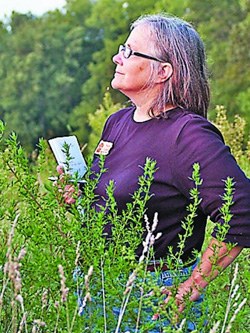Tracey Coulter’s unique Penn State experience led her from watershed management to helping landowners in the DCNR’s private rural and community forestry sector.

Tracey Coulter
Degrees Earned
M.S., Forest Resources, 2005
B.S., Forest Science, 2003 (now Forest Ecosystem Management)
A.S., Forest Technology, 2001
The Human Dimensions of Forest Management
As a forest program specialist, Coulter focuses on agroforestry and watershed programs at the Harrisburg office of the PA DCNR. She coordinates the DCNR's new agroforestry program, which helps private landowners establish trees on agricultural lands while protecting surrounding ecosystems. That includes forest farming (growing crops under tree canopy) and establishing windbreaks and vegetative buffers. Watershed conservation is a critical part of Coulter's effort. Working closely with the Chesapeake Bay Program Forest Workgroup, her office finds opportunities to expand watershed protection into upland areas.
Coulter enjoys working collaboratively with landowners and organizations indoors and out. "It's a new conversation where we're incorporating a lot of our forestry skills, but also incorporating some of our agricultural knowledge, which I'm still learning every day," she explains. Through creativity and networking, she is able to devise solutions that benefit landowners--and the environment.
Q: How did you get to where you are today?
A: As a traditional student, I studied botany in the Midwest, but was unable to finish that degree. When life brought me to PA, I was a single mom facing a career change. Then I was offered the opportunity to work nights and weekends. I had always wanted to finish my degree, so I enrolled at Penn State Mont Alto, working full-time and going to school full-time during the day. I thought, okay, I'll do an associate's degree, but I had great mentors at Mont Alto, and it was obvious I hadn't finished my education yet. Eventually, I was given the opportunity to do research at University Park, so after I graduated with my associate degree I moved up to State College and pursued an undergraduate degree in forest biology. Finally, I was able to complete a master's degree under Dr. Jim Finley, focusing on human dimensions in forestry. Because of my background in forest technology, biology, and human connections between people and their forests, it worked very well for me to go into rural and community forestry, which is the section of the DCNR that focuses on programs for private lands and communities. I began working for the section as a summer intern and was then hired into a full-time position. All these experiences have given me insight into the importance of connecting with private forest landowners.
Q: What's something important you have learned from your work experience?
A: There are people who say, "I got into forestry because I don't want to talk to people." More and more, it's become apparent that we must relate the importance of what we do, and the importance of forests, to people who don't have the same background or passion that many of our foresters do. We manage our forests for both human and environmental values. We work to appreciate what people value and we strive to continually educate landowners and communities on good management practices that can help them meet their goals.
Q: Does Penn State play any role in the work you're doing now?
A: The research done at Penn State is critical. We work with Dr. Eric Burkhart, who is the Plant Science Program Director managing native plants at Shaver's Creek and who also teaches the Agroforestry and Dendrology courses. His research on non-timber forest products and forest farming helps to inform our decisions on the landscape. The DCNR is responsible for oversight and maintenance of native plants, and one of those is ginseng. One innovative project we are working on is a collaborative effort with Penn State and PA Certified Organic to develop a ginseng harvesting verification program that will help to protect the plant while supporting local forest-based economies.
Q: What did you do as a forestry student?
Promoted Historical Markers at Mont Alto

